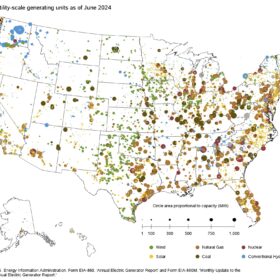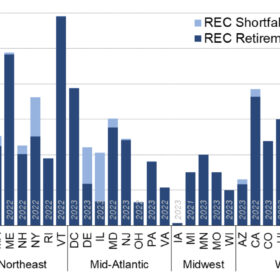U.S. Senators Joe Manchin (I-WV) and John Barrasso (R-WY), chair and ranking member of the Senate Energy and Natural Resources Committee, released the Energy Permitting Reform Act of 2024. Find the full bill text here.
The Act is designed to shorten timelines, before, during, and after litigation on federal authorizations for energy and mineral projects.
Manchin called the legislation “a commonsense, bipartisan piece of legislation that will speed up permitting and provide more certainty for all types of energy and mineral projects without bypassing important protections for our environment and impacted communities.”
The bill establishes 150-day statute of limitations from the date of the final agency action on a project; requires courts to expedite review of legal challenges; and sets a 180-day deadline for federal agencies to act on remanded authorizations.
The bill sets deadlines and doubles production targets for renewable energy permitting on federal lands. It also streamlines environmental reviews for low-disturbance renewable, electric grid, and storage projects. It also makes several changes to accelerate the permitting processes for fossil fuels projects.
The act also reforms existing backstop siting authority for interstate electric transmission lines sets requirements for interregional transmission planning. The provisions are designed to provide two pathways for transmission development that include clear standards for cost allocation among customers that benefit from a project. The legislation creates an interregional planning requirement that ensures regions jointly address needs and a process that allows individual applicants to propose national-interest projects.
Find a section-by-section breakdown of the legislation here.
“We have the technology, workforce, and financial capital to build great things, but we lack a governing process that is designed to succeed. This legislation changes that,” said Jason Grumet, chief executive officer, American Clean Power.
The Solar Energy Industries Association (SEIA) welcomed the legislation.
“For years, SEIA has been calling for a fundamental shift in the way we build transmission capacity and has long advocated for reforms that fairly allocate costs. While we’re still reviewing the details, this is a conversation worth having,” said Abigail Ross Hopper, president and chief executive officer, SEIA.
The Center for Biological Diversity warned that too many important environmental review processes are stripped in the legislation, particularly for the development of new fossil fuels infrastructure. In a letter to Senate majority leader Chuck Schumer, the Center warned:
“Weakening our bedrock environmental protection laws doesn’t help renewable energy. It only serves to enrich the fossil fuel industry,” said Camden Weber, climate and energy policy specialist at the Center for Biological Diversity. “Permitting reform is one of the most insidious euphemisms on Capitol Hill.”
A national study from the University of Texas found that from 2010 to 2021, less than 5% of solar and wind projects required a comprehensive environmental bill under the National Environmental Protection Act (NEPA).
This content is protected by copyright and may not be reused. If you want to cooperate with us and would like to reuse some of our content, please contact: editors@pv-magazine.com.









By submitting this form you agree to pv magazine using your data for the purposes of publishing your comment.
Your personal data will only be disclosed or otherwise transmitted to third parties for the purposes of spam filtering or if this is necessary for technical maintenance of the website. Any other transfer to third parties will not take place unless this is justified on the basis of applicable data protection regulations or if pv magazine is legally obliged to do so.
You may revoke this consent at any time with effect for the future, in which case your personal data will be deleted immediately. Otherwise, your data will be deleted if pv magazine has processed your request or the purpose of data storage is fulfilled.
Further information on data privacy can be found in our Data Protection Policy.